|
|
|
Sort Order |
|
|
|
Items / Page
|
|
|
|
|
|
|
| Srl | Item |
| 1 |
ID:
115276
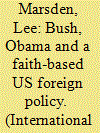

|
|
|
|
|
| Publication |
2012.
|
| Summary/Abstract |
In a calculated move to appeal to his core constituency during his first term, President George W. Bush launched domestic and international faith-based initiatives designed to leverage public finance for religious groupings to carry out social and welfare functions formerly performed by government or secular organizations. In December 2002 the Center for Faith-Based and Community Initiatives (CFBCI) was extended to the United States Agency for International Development (USAID). The Center's intention was to 'create a level playing field' for faith-based and community groups to compete for foreign assistance funding. These presidential initiatives are problematic, however, calling into question the first amendment-the separation of church and state. Upon taking office Barack Obama set up the Office of Faith-based and Neighborhood Partnerships, promising a greater emphasis on community/neighbourhood programs. The CFBCI remains a fixture in USAID and Obama shows as much enthusiasm for the initiative as his predecessor. Faith-based international relations and political science scholars have sought to build on these initiatives and call for a greater role for faith in US foreign policy. On the eve of the 2012 presidential election, this article considers the claims for a faith-based foreign policy by examining the construction of a faith-based discourse by academics and successive presidents. Using faith-based initiatives and USAID as a case-study, the article discusses criticisms of the policy and focuses on the role of a conservative evangelical organization, Samaritan's Purse, to illustrate the advantages and disadvantages of faith-based approaches. The article argues that advocates of faith-based foreign policy, in seeking special privileges for ecumenical religious actors, overlook their declining international significance and the opportunities afforded to less tolerant but more populist religious actors which have the potential seriously to harm US foreign policy objectives.
|
|
|
|
|
|
|
|
|
|
|
|
|
|
|
|
| 2 |
ID:
115281
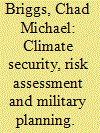

|
|
|
|
|
| Publication |
2012.
|
| Summary/Abstract |
Climate and environmental changes pose emerging and unique challenges to international security-as the global community experiences issues of food insecurity, severe droughts and floods-and have cascading impacts on energy supplies and infrastructure. Environmental hazards may shift abruptly, posing new risks to vulnerable systems and critical nodes in ways that diverge from historical experience. Effective risk assessments and planning will require understanding of how climate change will affect natural disasters and disaster response, and how hazards may be more extreme or unique from past experiences. This article discusses the role of climate change in affecting security planning from a military perspective, and how integration of scientific data and intelligence methods can foster assessment and effective response.
|
|
|
|
|
|
|
|
|
|
|
|
|
|
|
|
| 3 |
ID:
115279


|
|
|
|
|
| Publication |
2012.
|
| Summary/Abstract |
The United States and its closest allies now spend over $100 billion a year on intelligence. Ten years after 9/11, the intelligence machine is certainly bigger-but not necessarily better. American intelligence continues to privilege old-fashioned strategic analysis for policy-makers and exhibits a technocratic approach to asymmetric security threats, epitomized by the accelerated use of drone strikes and data-mining. Distinguished commentators have focused on the panacea of top-down reform, while politicians and practitioners have created entirely new agencies. However, these prescriptions for change remain conceptually limited because of underlying Anglo-Saxon presumptions about what intelligence is. Although intelligence is a global business, when we talk about intelligence we tend to use a vocabulary that is narrowly derived from the experiences of America and its English-speaking nebula. This article deploys the notion of strategic culture to explain why this is. It then explores the cases of China and South Africa to suggest how we might begin to rethink our intelligence communities and their tasks. It argues that the road to success is about individuals, attitudes and cultures rather than organizations. Future improvement will depend on our ability to recognize the changing nature of the security environment and to practise the art of 'intelligence among the people'. While the United States remains the world's most significant military power, its strategic culture is unsuited to this new terrain and arguably other countries have adapted to it better.
|
|
|
|
|
|
|
|
|
|
|
|
|
|
|
|
| 4 |
ID:
115278


|
|
|
|
|
| Publication |
2012.
|
| Summary/Abstract |
Since taking office, United States President Barack Obama has attempted to refocus and revitalize the US war against terrorism. The centrepiece of this effort has been an increased emphasis on the war in Afghanistan, which he has characterized as the real frontline of the war on terror-as opposed to the 'distraction' of the Iraq war. After years of fighting under the Bush administration, Obama has had to 'sell' to the US public the renewed effort in Afghanistan and bordering Pakistan in order to maintain support for his policy. In speeches and other public pronouncements, Obama has drawn heavily on the idea of 'sacrifice' to justify the deepening of the commitment to the war, arguing that the costs of the war are necessary in order to keep the US safe from further terrorist attacks. This article explores this symbolic engagement with the sacrifices being made in the name of keeping the United States 'safe' from terrorism. It considers whether this approach resonates with public and elite opinion; it also considers the sustainability of underlying public support for the war and analyses how Obama has adapted his approach in order to fulfil his goal of drawing the US intervention to a close. While Obama appears to have judged well the price that the US public is willing to pay to defend against terrorism, it is argued that there are major risks involved in using the central principle of sacrifice when justifying the war. Obama has risked creating a 'sacrifice trap' whereby the more emphasis is placed on the sacrifices being made, the more necessary it becomes to demonstrate outcomes that make those sacrifices worthwhile. Obama's ultimate objective of withdrawing US forces from Afghanistan may yet be undermined, therefore, by the justifications he has given for the continued importance of the commitment.
|
|
|
|
|
|
|
|
|
|
|
|
|
|
|
|
| 5 |
ID:
115283


|
|
|
|
|
| Publication |
2012.
|
| Summary/Abstract |
Twenty years on from the original Rio Summit and the emergence of sustainable development, which first raised awareness of the importance of the environment to humanitarian development, significant strides have been taken to integrate environmental considerations into humanitarian development, but such considerations still remain largely ostracized from core security and humanitarian theory and practice. An important issue and opportunity is therefore being ignored. This article argues that an evolutionary step beyond sustainable development is now required, both to unite under a common banner the work on this subject carried out to date, and to encourage further practical and theoretical work to be carried out to mainstream the environment into postwar recovery. To enable this transition, this article suggests adopting the concept of 'ecological development'. This concept of using the management and development of the environmental resources of water and biodiversity to mitigate conflict, promote peacebuilding and a transition from conflict towards peace-and a subsequent durable post-conflict recovery-is then expounded, demonstrated through case-studies of two very different conflicts, in the Democratic Republic of the Congo and in Afghanistan. The article concludes that through the implementation of ecological development, environmental management should be mainstreamed into security and humanitarian development theory and practice in order to promote a more durable and effective methodology for post-conflict recovery in the twenty-first century.
|
|
|
|
|
|
|
|
|
|
|
|
|
|
|
|
| 6 |
ID:
115277
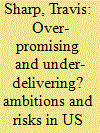

|
|
|
|
|
| Publication |
2012.
|
| Summary/Abstract |
Recent changes to US defence strategy, plans and forces have placed the United States at greater risk of over-promising and under-delivering on its global security ambitions. In 2012, the Obama administration released a new defence strategic guidance document to adapt to a shifting security environment and defence budget cuts. The guidance upholds the two long-standing American goals of global pre-eminence and global reach, but seeks to apply this military power by using new planning and regional concepts. It revises the Department of Defense's force planning construct, an important tool used to size US military forces, and identifies the Asia-Pacific and the greater Middle East as the two regions where the US military should focus its attention and resources. There are three major risks facing this revised US strategy: emerging security threats, the role of US allies and partners, and domestic constraints in the United States. Included in these risks are the proliferation of advanced military technologies, the US response to the rise of China, the continued prevalence of state instability and failure, the capability and commitment of NATO and other US allies, additional US budget cuts, political polarization in the United States, and interservice competition within the US military. In light of these risks, the United States faces a future in which it will continue to struggle to direct its military power towards its most important geopolitical priorities, such as rebalancing towards the Asia-Pacific, as opposed simply to respond to the many security surprises that are certain to arise. If the past is any guide, American political leaders will respond to the aforementioned risks in the worst way possible: by maintaining the current US defence strategy while slashing the resources to support it.
|
|
|
|
|
|
|
|
|
|
|
|
|
|
|
|
| 7 |
ID:
115275
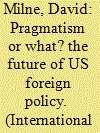

|
|
|
|
|
| Publication |
2012.
|
| Summary/Abstract |
This article discusses the intellectual sources of the presidential candidates' foreign policies. In the case of Barack Obama, the article examines the formation of his worldview, his intellectual inspirations, his most significant foreign policy appointments and the diplomatic course he has pursued as president. Mitt Romney's foreign policy views are harder to identify with certainty, but his business and political career-as well as the identity and dispositions of his advisory team-all provide important clues as to the policies he will pursue if elected in November 2012. The article finds much common ground between the two candidates; both are results-driven pragmatists, attuned to nuance and complexity, who nonetheless believe-in agreement with Robert Kagan-that US geostrategic primacy will continue through the span of the twenty-first century. The gulf between the candidates on domestic policy is vast, but on foreign policy-Romney's bellicose statements through the Republican primaries served a purpose that has passed-there is little between them.
|
|
|
|
|
|
|
|
|
|
|
|
|
|
|
|
| 8 |
ID:
115282


|
|
|
|
|
| Publication |
2012.
|
| Summary/Abstract |
The use of the phrase 'resource wars' covers an ever-widening list of categories that range from minerals and oil to rhino horn, timber and much more; anchored around this milieu are phrases like 'natural security' and 'environmental security'. While this proliferation has splintered the identity of the phrase 'resource wars', the more worrying impact is that it has allowed governments to ignore pressing problems related to biodiversity and the environment because the solutions are deemed too complex, time-consuming, and expensive with indeterminate outcomes. However, failing to address these problems not only increases the risk of conflict but also leads to a lack of trust in governments with the result that they risk being seen as 'the enemy of the people'. A first step to avoid this negative spiral should be to rethink the phrase 'resource wars'.
|
|
|
|
|
|
|
|
|
|
|
|
|
|
|
|
| 9 |
ID:
115280
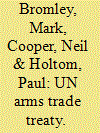

|
|
|
|
|
| Publication |
2012.
|
| Summary/Abstract |
The UN conference to negotiate an Arms Trade Treaty (ATT) concluded on 27 July 2012 without reaching consensus on the text of a draft treaty and saw both the US and Russia calling for more time to negotiate. The ATT process marks the latest in a series of attempts to insert human security concerns into arms export controls. The setback in July raises questions about the current level of international support for the human security agenda, as well as the relative power of different actors to shape global governance structures. This article locates the ATT negotiations in the broader history of multilateral efforts to regulate the international arms trade, from the 1890 Brussels Act to post-Cold War initiatives. The historical record shows that such efforts are more likely to succeed if they are negotiated or imposed by major arms exporters. The introduction of human security concerns, as well as the merging of export control and arms control agendas, went some way towards reversing this trend. In particular, it created a broad international coalition of supportive states and NGOs from the global North and South. Yet disagreements over the purpose of an ATT remained. The draft ATT included human security provisions, but China, Russia, the US and a number of emerging powers ensured that state security considerations remained paramount in decision-making on arms exports. The US was the first major actor to announce its unwillingness to sign the draft ATT in July 2012 and two alternative interpretations of US actions are considered. The article concludes by considering the options available to supporters of the ATT process following the 2012 conference and examines the notion that the ATT campaign has become an initiative 'out of its time', one that might have had success in the 1990s but not in current circumstances.
|
|
|
|
|
|
|
|
|
|
|
|
|
|
|
|
|
|
|
|
|